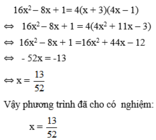16x2-8x+1
Hãy nhập câu hỏi của bạn vào đây, nếu là tài khoản VIP, bạn sẽ được ưu tiên trả lời.


Ta có
B = 4 – 16 x 2 – 8 x = 5 – ( 16 x 2 + 8 x + 1 ) = 5 – [ ( 4 x ) 2 + 2 . 4 x . 1 + 1 2 ] = 5 – ( 4 x + 1 ) 2
Nhận thấy 4 x + 1 2 ≥ 0; Ɐx
=> 5 – 4 x + 1 2 ≤ 5
Dấu “=” xảy ra khi 4 x + 1 2 = 0 ó x = - 1 4
Đáp án cần chọn là: A

\(a,\Leftrightarrow\left(x-2\right)\left(3x-1\right)=0\Leftrightarrow\left[{}\begin{matrix}x=2\\x=\dfrac{1}{3}\end{matrix}\right.\\ b,\Leftrightarrow\left(x-2\right)^3=0\Leftrightarrow x-2=0\Leftrightarrow x=2\\ c,\Leftrightarrow\left(4x-3x-3\right)\left(4x+3x+3\right)=0\\ \Leftrightarrow\left(x-3\right)\left(7x+3\right)=0\Leftrightarrow\left[{}\begin{matrix}x=3\\x=-\dfrac{3}{7}\end{matrix}\right.\\ d,\Leftrightarrow x^2\left(x-1\right)-4\left(x-1\right)^2=0\\ \Leftrightarrow\left(x-1\right)\left(x^2-4x+4\right)=0\\ \Leftrightarrow\left(x-1\right)\left(x-2\right)^2=0\Leftrightarrow\left[{}\begin{matrix}x=1\\x=2\end{matrix}\right.\)

`A=16x^2+8x+5`
`=16x^2+8x+1+4`
`=(4x+1)^2+4>=4`
Dấu "=" xảy ra khi `4x+1=0<=>x=-1/4`
`B=x^2-x`
`=x^2-x+1/4-1/4`
`=(x-1/2)^2-1/4>=-1/4`
Dấu "=" xảy ra khi `x=1/2`
`C=a^2-2a+b^2+6b+2021`
`=a^2-2a+1+b^2+6b+9+2011`
`=(a-1)^2+(b+3)^2+2011>=2011`
Dấu "=" xảy ra khi \(\begin{cases}a=1\\b=-3\\\end{cases}\)

\(C=16x^2-8x+2024\)
\(\Rightarrow C=16x^2-8x+1+2023\)
\(\Rightarrow C=\left(4x-1\right)^2+2023\ge2023\left(\left(4x-1\right)^2\ge0\right)\)
\(\Rightarrow Min\left(C\right)=2023\)
\(D=-25x^2+50x-2023\)
\(\Rightarrow D=-\left(25x^2-50x+25\right)-1998\)
\(\Rightarrow D=-\left(5x-5\right)^2-1998\le1998\left(-\left(5x-5\right)^2\le0\right)\)
\(\Rightarrow Max\left(D\right)=1998\)
\(B=-x^2+20x+100=-\left(x^2-20x+100\right)+200=-\left(x-10\right)^2+200\le200\left(-\left(x-10\right)^2\le0\right)\)
\(\Rightarrow Max\left(B\right)=200\)
\(E=\left(2x-1\right)^2-\left(3x+2\right)\left(x-5\right)\)
\(\Rightarrow E=4x^2-4x+1-\left(3x^2-13x-10\right)\)
\(\Rightarrow E=4x^2-4x+1-3x^2+13x+10\)
\(\Rightarrow E=x^2+9x+11=x^2+9x+\dfrac{81}{4}-\dfrac{81}{4}+11\)
\(\Rightarrow E=\left(x+\dfrac{9}{2}\right)^2-\dfrac{37}{4}\ge-\dfrac{37}{4}\left(\left(x+\dfrac{9}{2}\right)^2\ge0\right)\)
\(\Rightarrow Min\left(E\right)=-\dfrac{37}{4}\)
\(F=\left(3x-5\right)^2-\left(3x+2\right)\left(4x-1\right)\)
\(\Rightarrow F=9x^2-30x+25-\left(12x^2+3x-2\right)\)
\(\Rightarrow F=-3x^2-33x+27=-3\left(x^2-10x+9\right)\)
\(\Rightarrow F=-3\left(x^2-10x+25\right)+48=-3\left(x-5\right)^2+48\le48\left(-3\left(x-5\right)^2\le0\right)\)
\(\Rightarrow Max\left(F\right)=48\)

a, \(x^4-4x^3-6x^2-4x+1=0\)(*)
<=> \(x^4+4x^2+1-4x^3-4x+2x^2-12x^2=0\)
<=> \(\left(x^2-2x+1\right)^2=12x^2\)
<=>\(\left(x-1\right)^4=12x^2\) <=> \(\left[{}\begin{matrix}\left(x-1\right)^2=\sqrt{12}x\\\left(x-1\right)^2=-\sqrt{12}x\end{matrix}\right.\)<=> \(\left[{}\begin{matrix}x^2-2x+1-\sqrt{12}x=0\left(1\right)\\x^2-2x+1+\sqrt{12}x=0\left(2\right)\end{matrix}\right.\)
Giải (1) có: \(x^2-2x+1-\sqrt{12}x=0\)
<=> \(x^2-2x\left(1+\sqrt{3}\right)+\left(1+\sqrt{3}\right)^2-\left(1+\sqrt{3}\right)^2+1=0\)
<=> \(\left(x-1-\sqrt{3}\right)^2-3-2\sqrt{3}=0\)
<=> \(\left(x-1-\sqrt{3}\right)^2=3+2\sqrt{3}\) <=> \(\left[{}\begin{matrix}x-1-\sqrt{3}=\sqrt{3+2\sqrt{3}}\\x-1-\sqrt{3}=-\sqrt{3+2\sqrt{3}}\end{matrix}\right.\) <=> \(\left[{}\begin{matrix}x=\sqrt{3+2\sqrt{3}}+\sqrt{3}+1\left(ktm\right)\\x=-\sqrt{3+2\sqrt{3}}+\sqrt{3}+1\left(tm\right)\end{matrix}\right.\)
=> \(x=-\sqrt{3+2\sqrt{3}}+\sqrt{3}+1\)
Giải (2) có: \(x^2-2x+1+\sqrt{12}x=0\)
<=> \(x^2-2x\left(1-\sqrt{3}\right)+\left(1-\sqrt{3}\right)^2-\left(1-\sqrt{3}\right)^2+1=0\)
<=> \(\left(x+\sqrt{3}-1\right)^2=3-2\sqrt{3}\) .Có VP<0 => PT (2) vô nghiệm
Vậy pt (*) có nghiệm x=\(-\sqrt{3+2\sqrt{3}}+\sqrt{3}+1\)

\(a,=\left(5x-1\right)^2\\ b,=\left(x+4\right)^2\\ c,=\left(4x+3y\right)^2\\ d,=\left(\dfrac{x}{4}+2y\right)^2\)

\(16x^2-8x+1\\ =\left(16x^2-4x\right)-\left(4x-1\right)\\ =4x\left(4x-1\right)-\left(4x-1\right)\\ =\left(4x-1\right)\left(4x-1\right)\\ =\left(4x-1\right)^2\)
(4x)^2 - 2.4x.1 + 1 = 0
(4x - 1)^2 = 0
4x - 1 = 0
x = 1/4